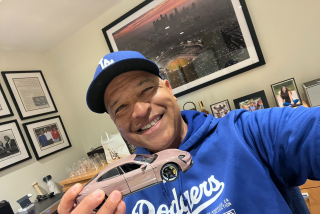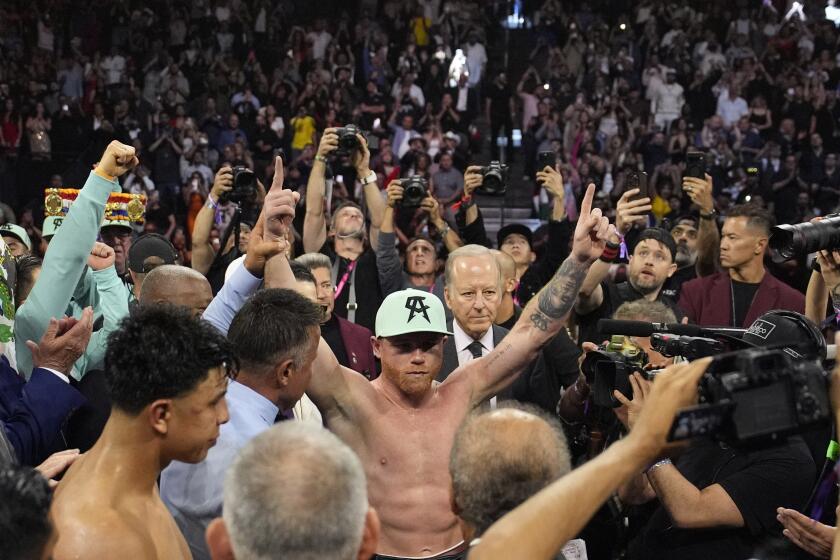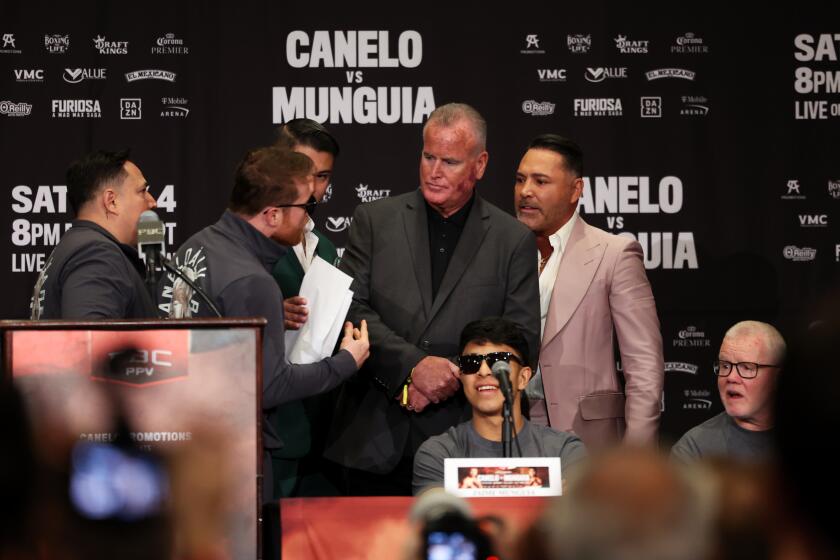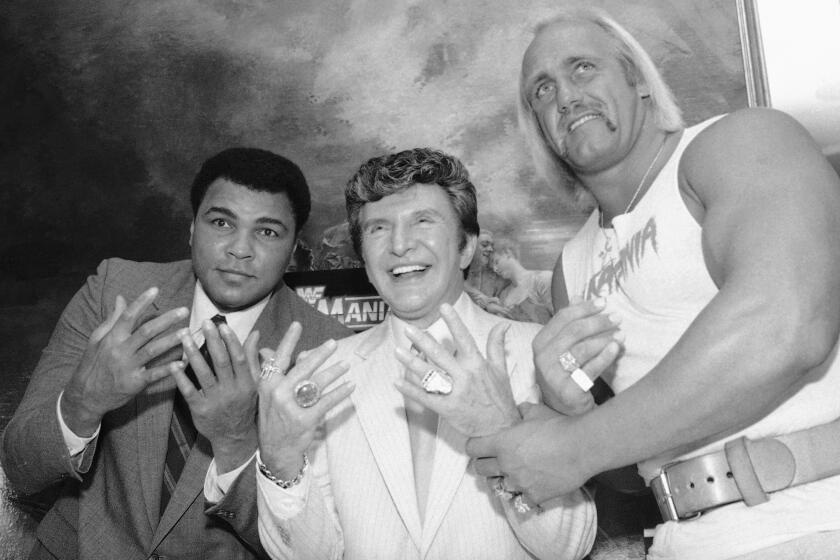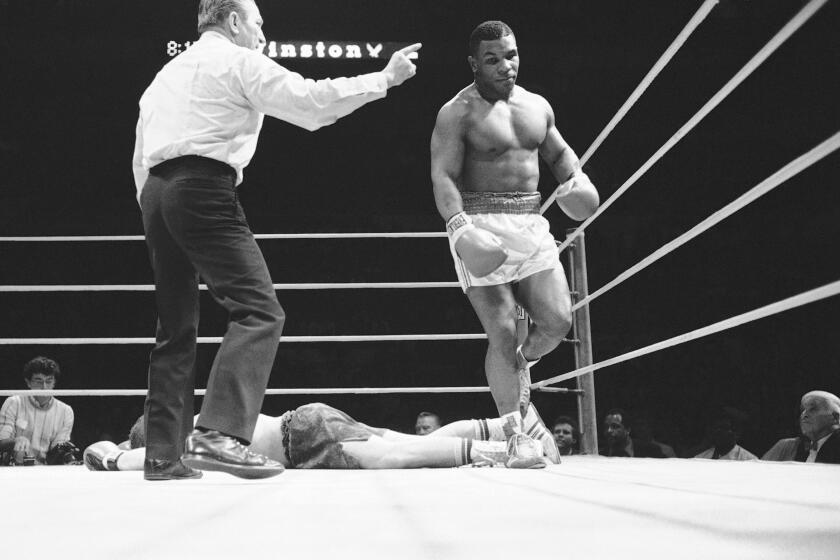20 Years Ago, the Phantom Struck in Lewiston--and Changed Boxing
It’s known as the fight of the “phantom punch,” that sweltering night 20 years ago Saturday when a sneering Cassius Clay KO’d Sonny Liston and forever changed the face of boxing.
“Fight stench rocks Maine,” a Boston headline screamed after the heavyweight champion (now known as Muhammad Ali) knocked out Liston in the first round before 2,434 fans, the smallest crowd for a world championship bout in modern times.
“The blackest night in boxing,” said Tommy Farr, a British heavyweight who lost a 15-round decision to Joe Louis in 1937.
The night of May 25, 1965, is forever etched in boxing lore, when the world focused on the tiny Central Maine Youth Center, known to everyone as St. Dominic’s Arena.
“I guess the fight put Lewiston on the map,” said Joe Graziano, owner of nearby Graziano’s Restaurant, where boxing pictures line the walls and boxing trivia abounds in conversation. “People still talk about it all the time.
“What they say is, ‘I just sat down, looked around the place for my friends and golly it was all over. I never even saw the punch.”’
Indeed, the cry of a punch that nobody saw echoed through the land after Ali retained the championship he had won on Feb. 25, 1964, in Miami Beach, when Sonny “the Bear” Liston refused to answer the bell for the seventh round.
The fight ushered out boxing’s golden era of the 1950s and ‘60s, an era of Rocky Marciano and Sugar Ray Robinson, and ushered in the era of Muhammad Ali.
The Ali era in turn gave way to today’s chaos of competing champions, each recognized by a different commission, many of them unknown to the American public.
Boxing, of course, never had a squeaky clean image, and perhaps that has always been part of its raffish charm.
The parking lot at “St. Dom’s” Arena was jammed, one sportswriter penned, “by the citizens who came to stare at the principal figures and the mascaraed, fur-wearing dolls who always show up in the $100 ringside seats with their nattily attired escorts.”
But the stench of sleaze surrounding the Lewiston fight went beyond mere whispers of impropriety, leading to state and congressional calls for inquiry.
In contrast to today’s little known warriors, tickets for the Clay-Liston fight did not need the combatants’ names printed on them. Tickets merely had pictures of the fighters marked “champion” and “challenger.”
“That fight marked a loss of innocence for the old-time fight fans,” said Herbert Goldman, historian for Ring magazine, the bible of boxing.
“The old fight fans seemed to lose interest, and the new fight fans came in after that fight,” he said. “It was a real line of demarcation, marking a new generation.
“At the time I thought it was a fix and I still do,” Goldman said. “The thing that convinces me more than anything is the time of the KO. What are the odds of a fight ending in one minute flat? Something stinks in Denmark.”
The official time of the fight, marred by timekeeping problems, was 1:00, although the Ring Record Book lists the time at 1:52, “because the one-minute time was so outrageous for purposes of historical accuracy,” Goldman said.
The famous bout wound up in Maine only after several states refused to stage it. Promoter Sam Michael had just two weeks to prepare for the match, and a comedy of errors ensued.
“We had strung cameras above the ring to get bird’s-eye shots, but it was so hot in there the flashbulbs were all going off before the fight even started,” said photographer Donald Robinson, who covered the fight for UPI.
Singer Robert Goulet, a frequent visitor to Maine, gained notoriety when he forgot the words to the National Anthem before the main event.
There was also a foul-up with an official stopwatch and referee Jersey Joe Walcott could not find the knockdown timekeeper after Liston was flattened.
Promoter Michael, 79, who promoted his first bout in 1922 at age 16 in a Lowell, Mass., church, insists he saw the blow that put the scowling Liston on the canvas.
“I saw it. It did not land on his chin, it landed on his cheek,” said Michael, later chairman of the Maine Athletic Commission, who still has a few unsold $100 tickets from the fight.
“I can visualize it now,” he said. “Liston came lunging with a left and Muhammad Ali threw a right over his left and got him on the cheek. If he hit him on the chin, he’d still be out.”
Charles (Sonny) Liston was found dead by his wife in Las Vegas on Jan. 5, 1971, taking his secrets to the grave. The coroner’s office estimated he had been dead five days, and traces of morphine and codeine were found in his system.
Ali, who became one of the world’s best-known figures, was the only man to win the world heavyweight championship three times. He retired for a final time after he lost to Trevor Berbick in December 1981.
“I wrote Cassius Clay a letter but never heard back from him,” said restaurateur Graziano. “I’m an old timer. I still call him Cassius Clay.
“Marvin Hagler, Willie Pep and a lot of others have been in here, but not Clay,” he said. “I have the Round 1 card that they held up for that fight. It’s framed and on the wall. I wanted him to see it but I guess he doesn’t want to.”
More to Read
Get our high school sports newsletter
Prep Rally is devoted to the SoCal high school sports experience, bringing you scores, stories and a behind-the-scenes look at what makes prep sports so popular.
You may occasionally receive promotional content from the Los Angeles Times.

